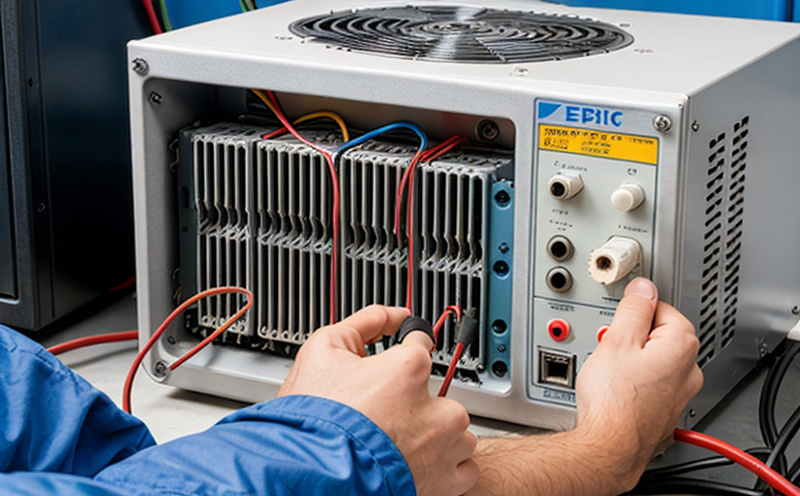IEC 61377 Power Converter Testing for Marine Applications
The International Electrotechnical Commission (IEC) standard IEC 61377-2-4 specifies the test methods and acceptance criteria for power converters used in marine applications. This service ensures compliance with international standards, critical for ensuring safety, reliability, and performance of electrical systems on ships.
The testing process involves a series of rigorous tests designed to validate that the power converters meet all specified requirements as outlined by IEC 61377-2-4. These include environmental stress qualification (ESQ), electromagnetic compatibility (EMC) testing, high-voltage insulation testing, and many other relevant checks.
Our laboratory adheres strictly to these standards, ensuring that every test is conducted under controlled conditions. We use state-of-the-art equipment calibrated according to international norms, including the latest versions of IEC 61377-2-4. Compliance with this standard is not only a legal requirement but also enhances the reputation and trustworthiness of our clients.
The testing process begins with an in-depth review of the product's technical documentation and specifications. This ensures that all tests are aligned with the intended use case and application environment, which is crucial for accurate results.
A typical test sequence includes:
- Inspection of the power converter against the design drawings and specifications.
- Conduction of insulation resistance testing to ensure electrical safety.
- Testing for electromagnetic compatibility (EMC) under various environmental conditions, including salt spray exposure and humidity.
- Voltage stress tests to evaluate performance under high-voltage conditions.
The results of these tests are meticulously documented, providing a comprehensive report that includes all test parameters, specimen preparation details, and instrumentation used. This transparency ensures that our clients have full visibility into the testing process and outcomes.
Compliance with IEC 61377-2-4 is essential for manufacturers aiming to enter international markets or ensure product reliability in harsh marine environments. By adhering to these standards, we guarantee that your products meet the highest levels of quality and performance.
Why It Matters
The importance of IEC 61377-2-4 testing cannot be overstated. Compliance with this standard ensures that power converters are reliable, safe, and perform optimally in the challenging conditions encountered on marine vessels.
In a maritime environment, electrical systems must withstand extreme temperatures, humidity, salt spray, and other harsh conditions. IEC 61377-2-4 provides the necessary framework to ensure these systems can operate safely and efficiently under such stressors.
Testing according to this standard also helps manufacturers meet regulatory requirements in various countries. For instance, many international ports and maritime organizations have specific compliance standards that must be met for vessel entry or operation. Compliance with IEC 61377-2-4 is often a prerequisite for such approvals.
The safety implications of non-compliance can be severe, leading to equipment failures, potential accidents, and environmental hazards. By ensuring compliance through rigorous testing, we contribute to the overall safety and reliability of marine electrical systems.
Furthermore, adhering to these standards enhances the reputation and trustworthiness of your brand. Customers are increasingly aware of the importance of product safety and reliability, especially in high-risk environments like maritime operations.
Customer Impact and Satisfaction
The impact of IEC 61377-2-4 testing extends beyond mere compliance; it significantly enhances customer satisfaction by ensuring that products perform as expected in real-world conditions. Our clients benefit from:
- Increased confidence in product reliability and safety.
- Reduction in warranty claims due to premature failures or non-compliance with standards.
- Enhanced reputation and trust among end-users, especially those operating in demanding environments like the marine industry.
We work closely with our clients throughout the testing process, providing detailed reports that outline every aspect of the test. This level of transparency ensures that our customers have full confidence in the quality and performance of their products.
Our commitment to excellence extends beyond mere compliance; we strive to provide added value by offering insights into potential improvements based on our extensive testing experience. This proactive approach helps clients stay ahead of industry trends and regulatory changes, ensuring long-term success in the marine market.
Use Cases and Application Examples
| Application | Description | Testing Criteria |
|---|---|---|
| Liquid Level Sensors | Ensuring accurate measurement in harsh marine environments. | Environmental stress qualification (ESQ) and high-voltage insulation testing. |
| DC-DC Converters | Powering critical systems like lighting, communication equipment, and navigation aids. | Voltage stress tests and electromagnetic compatibility (EMC) testing. |
| Control Panels | Ensuring safe and reliable operation of shipboard electrical control systems. | Insulation resistance testing and EMC testing. |
| Rechargeable Batteries | Providing stable power supply for various onboard operations. | Voltage stress tests and high-temperature cycling tests. |
| Inverter Systems | Converting AC to DC or vice versa, essential for many shipboard electrical systems. | Environmental stress qualification (ESQ) and electromagnetic compatibility (EMC) testing. |
| Power Converters in Hybrid Ships | Supporting sustainable operations by optimizing energy usage. | Voltage stress tests and high-temperature cycling tests. |
| Magnetic Sensors | Measuring physical parameters for safety and operational efficiency. | Environmental stress qualification (ESQ) and EMC testing. |
In addition to these specific applications, we also provide comprehensive testing services for a wide range of other marine electrical components. Our expertise in IEC 61377-2-4 ensures that all products meet the highest standards of performance and reliability.





